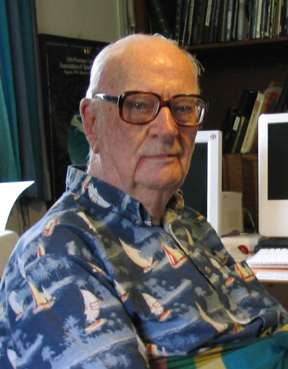„To jest puste, ciągnie się w nieskończoność i… O mój Boże, tam jest pełno gwiazd!”
ostatnie słowa nadane na Ziemię przez Davida Bowmana.
Odyseja Kosmiczna 2001
Arthur C. Clarke, właśc. sir Arthur Charles Clarke – brytyjski prozaik, pisarz fantastycznonaukowy, propagator kosmonautyki. M.in. na podstawie jego koncepcji powstały stacje orbitalne.
Jego najbardziej znanym dziełem jest książka 2001: Odyseja kosmiczna oraz nakręcony przez Stanleya Kubricka film o tym samym tytule według wspólnego scenariusza Clarke’a i Kubricka.
Wikipedia

„To jest puste, ciągnie się w nieskończoność i… O mój Boże, tam jest pełno gwiazd!”
ostatnie słowa nadane na Ziemię przez Davida Bowmana.
Odyseja Kosmiczna 2001
Odyseja Kosmiczna 2001
Źródło: Stanisław Lem, Fantastyka i futurologia
Źródło: Keith Tutt, W poszukiwaniu nieograniczonej energii, wyd. Amber, seria Tajemnice Nauki
„Nie chciałbym się upierać, Dave, ale ja jestem niezdolny do popełniania omyłek.”
Postać: HAL 9000
Odyseja Kosmiczna 2001
„Dostatecznie zaawansowana technologia nie różni się od magii.”
Źródło: Gregory Hartley, Maryann Karinch, Podręcznik manipulacji, Warszawa 2011, wyd. Bellona, s. 65.
“Now I understand,” said the last man.”
Źródło: Childhood's End
“The thing’s hollow—it goes on forever—and—oh my God!”
Źródło: 2001: A Space Odyssey
“I don't believe in God but I'm very interested in her.”
As quoted in Multiple Intelligences in Practice : Enhancing Self-esteem and Learning in the Classroom (2006) by Mike Fleetham, Section 2 : Using MI
2000s and attributed from posthumous publications
“Open the pod bay doors, Hal.”
Źródło: 2001: A Space Odyssey
“Humor was the enemy of desire.”
Źródło: 2010: Odyssey Two
“… the newspapers of Utopia, he had long ago decided, would be terribly dull.”
Źródło: 2001: A Space Odyssey
As quoted in The Mammoth Book of Zingers, Quips, and One-Liners (2004) by Geoff Tibballs, p. 264
2000s and attributed from posthumous publications
Źródło: Profiles of the Future: An Inquiry into the Limits of the Possible
“Overhead, without any fuss, the stars were going out.”
1950s
Źródło: "The Nine Billion Names of God", 1953
“But he knew well enough that any man in the right circumstances could be dehumanised by panic.”
Źródło: 2001: A Space Odyssey
“The time was fast approaching when Earth, like all mothers, must say farewell to her children.”
Źródło: 2001: A Space Odyssey
“When in doubt, say nothing and move on.”
Źródło: Rendezvous with Rama
“Excessive interest in pathological behavior was itself pathological”
Źródło: 3001: The Final Odyssey
“Now I can rejoice that I knew you, rather than mourn because I lost you.”
Źródło: The Songs Of Distant Earth
We'll Never Conquer Space (1960)
Źródło: The Fountains of Paradise (1979), Chapter 16 “Conversations with Starglider” (p. 95)
Źródło: 1970s, Chapter 3 (The Future of Transport) in Profiles of the Future (7th printing, 1972)
“Even though you were once a goddess, Kalidasa’s heaven was only an illusion.”
Źródło: The Fountains of Paradise (1979), Chapter 11 “The Silent Princess” (p. 67)
Źródło: The City and the Stars (1956), Chapter 7 (p. 44)
“Human judges can show mercy. But against the laws of nature, there is no appeal.”
"Sir Arthur's Quotations" http://www.clarkefoundation.org/about-sir-arthur/sir-arthurs-quotations/, The Arthur C. Clarke Foundation.
Disputed
“If children have interests then education happens.”
As quoted in Ted Talk "The child-driven education" http://www.ted.com/talks/sugata_mitra_the_child_driven_education.html by Sugata Mitra (2012)
2000s and attributed from posthumous publications
Źródło: The City and the Stars (1956), Chapter 5 (p. 33)
The Exploration of Space (1951)
1950s
As quoted in "Humanity will survive information deluge — Sir Arthur C Clarke" in OneWorld South Asia (5 December 2003) http://southasia.oneworld.net/article/view/74591/1
2000s and attributed from posthumous publications